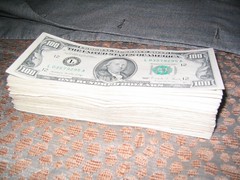 Much of what I hear about the economy today is doom and gloom. But personally, I’m hopeful. The market is cyclical. It’s always been this way, for as long as it’s been around. That means it’ll rebound someday.
Much of what I hear about the economy today is doom and gloom. But personally, I’m hopeful. The market is cyclical. It’s always been this way, for as long as it’s been around. That means it’ll rebound someday.
In the meantime, there are ways to take advantage of this falling economy. There are lots of ways to save money – and even make money!
Here are 10 tips on how to do that:
-
Short Sell the Market
Short selling is a method of making money when something loses value. For instance, you could “short” a stock and make money when its stock price falls. And as you can see, lots of stock prices are falling right now. However, the SEC can sometimes place temporary restrictions against short selling, which it did earlier this season.
-
Buy Low
Prices fall in recessions. That means you can make some great buys at great prices! Assuming you’ve got the money, of course. But if you do, this is a fantastic time to pick up some choice stocks. Then, when the market rebounds, you can sell those stocks for a tidy profit. Buy low, sell high!
-
Negotiate Your Credit Card Rates
Lots of credit card companies will give you a lower interest rate if you just ask. It helps if you have a good credit history and have been a long-time customer though. But even saving a few ounces of a percentage point can add up in the long run, so it’s worth asking. Then, if you must use a credit card, use those with the lowest interest rates first.
-
Trim the Fat
Review your bills and pay attention to where you could tighten up your belt. You might be paying a recurring fee for something you don’t really use. Maybe your barely-used gym membership could be ditched in favor of joining a weekly running group. Or maybe all those extra cable channels aren’t really necessary.
-
Buy Used Items
If you can make do with a used item instead of a brand-spanking-new one, do it. Lots of people are selling their stuff now – especially on eBay (EBAY) and Craigslist. That means lots of potentially great bargains. A recession is a great time for bargain hunting and finding cheap, high-quality stuff.
-
Sell Your Stuff
And speaking of used items, if you have a bunch of stuff lying around that you’ll never use, sell it. If there’s absolutely no more use for it, why not squeeze a buck or three out of it? The downside is that you won’t be able to fetch as great a price if the economy was better. But if you need cash right now, this can help. You’ll be able to clean up some of that clutter in your room too.
-
Buy Bulk
You can often get more value for your dollar if you buy from wholesalers and discount warehouses like Costco (COST). If you’re a single person living alone, this might not be worth it because of the annual fees, but if you’re in a family or multi-person household, the savings can add up over time.
-
Do It Yourself
There are lots of things you can do yourself. Wash your own car, make your own lunch, fix your own plumbing, etc. Search online or check out your library for a do-it-yourself guide for any task. You’ll gain the added benefit of learning new skills too. The downside is that this can take up a lot of time, which may not be feasible for everyone.
-
Do Free Activities
There are lots of ways to spend your time without spending a dime. I’ve got a long list of free stuff to do in San Francisco. I’m sure there are similar lists for your city too. If not, some common options are parks, museums, and art galleries. And if you love to read, check out your local library too.
-
Prioritize, Prioritize, Prioritize
Finally, be strict about your true priorities. What is absolutely critical to you? Every decision you make has trade-offs. If it is absolutely necessary that you splurge on that new sofa, then you’ll have to hold back on dining out every Friday night. Or, if money is that tight and simply putting food on the table is a priority, then cut back on all family vacations.
I hope these tips help. Do you have any more money-saving or money-making tips?

 I’m all for saving money. How about you?
I’m all for saving money. How about you?